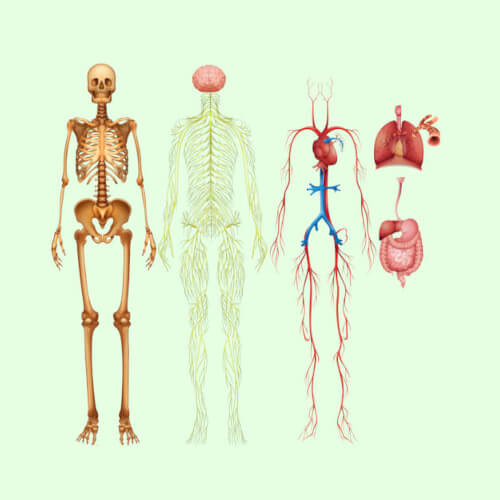


The human body is the physical structure of a human being. This includes a person's head, hair, neck, torso (with thorax and abdomen), arms, hands, legs, and feet. A person's body is made up of many different types of cells, which in turn create tissues and organs. These tissues and organs form systems that work together to keep things balanced, like sugar and oxygen (O2) levels in a person's blood. Scientists study the human body through the fields of anatomy, physiology, histology, and embryology.
To make it easier to understand, scientists typically study specific parts of the human body, separated into these groups, or systems:
Unraveled from its coils, the DNA molecule from a single human cell would stretch about 2 m (6.6 ft) long. In our bodies, we have approximately 30 to 37 trillion cells. This means the total length of DNA would be approximately 60 to 74 trillion meters, or 60 to 74 billion kilometers (37.3 to 46 billion miles)!
An adult human typically has 206 bones in their body, while a newborn baby has around 270 bones. During development, some bones in a baby's body are not fully fused with one another and consist of separate parts connected by cartilage. Over time, as babies grow, some of these bones fuse together, resulting in a decrease in the total number of bones. By adulthood, many of the separate bones have fused into larger structures, such as the skull, pelvis, and spine, reducing the overall count to 206.
Our intestines are folded within our abdomens to fit into a pretty small space. These folds increase the surface area available for nutrient absorption during the digestion.
While the length of a human's intestines can vary depending on factors such as age, height, and individual differences, on average, the combined length of the small and large intestines in an adult human is estimated to be around 5 meters (16.4 feet)! The small intestine is the longer of the two, measuring about 6 to 7 m (20 to 23 ft) in length, while the large intestine is shorter, typically around 1.5 to 1.8 m (5 to 6 ft) long.
Located deep inside the ear, the stirrup, or stapes, measures only around 3 mm in length. Its purpose is to transfer vibrations from the outer ear—our earlobes, ear canal, and eardrums—to the inner ear—the cochlea, semicircular canals, and auditory nerves—where sounds are processed into signals our brains can understand.
While circulation can vary slightly depending on heart rate, blood vessel size, and a person's health, an average estimate is that it takes approximately 20 to 30 seconds for a red blood cell to complete one full trip through the body. This estimation is based on the average speed of blood flow, which is approximately 5 L (1.3 gal) every minute in a resting adult.
Biologists estimate this number based on the number of scent receptors in the human nose and the brain's ability to process and store this information. Individual capabilities may vary, and genetics, age, and exposure to specific smells can also influence scent memory. Often, strong memory associations also play a role in whether or not we remember certain scents.
However, researchers have also found that trained professionals in scent-related fields, such as perfumers and winemakers, can identify and differentiate many more smells than the average person. This suggests that with training and experience, our scent memory capacity can be improved.The human body is host to a vast ecosystem of microorganisms, including bacteria, viruses, fungi, and other microbes, collectively known as the "human microbiota." Biologists estimate that the number of bacterial cells inhabiting the human body is approximately 10 times greater than the number of human cells! Luckily, these bacteria cells are much, much smaller than our own.
This estimation is based on studies that have analyzed the microbial populations in different areas, such as the skin, digestive system, and mouth. The human microbiota plays crucial roles in digestion, immune system development, vitamin synthesis, and protection against harmful pathogens.
On average, a healthy adult human produces about 0.5 to 1.5 L (.13 - .40 gal) of saliva per day. That being said, saliva production can depend greatly on age, hydration level, oral health, and overall health conditions.
The average mass of a human brain is around 1.3 to 1.4 kg (2.9 - 3.1 lbs). However, there have been recorded cases of individuals with larger-than-average brain sizes. One such case involved the brain of an individual weighing approximately 2.3 kg (5.1 lbs)!